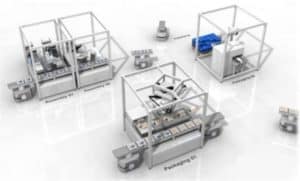Nokia, NTT DOCOMO and OMRON Corporation this week have agreed to conduct joint field trials using 5G at their plants and other production sites. As part of the trial, Nokia will provide the enabling 5G technology and OMRON the factory automation equipment while NTT DOCOMO will run the 5G trial.
The three companies aim to significantly enhance productivity at future manufacturing plants. The trial follows the increasing demand for wireless communications at manufacturing sites driven by the need for stable connectivity between IoT devices, including those embedded in machine controls.
As background noise from machines and the movement of people have the potential to interfere with wireless communications, the trial will aim to verify the reliability and stability of 5G technology deployed by conducting radio wave measurements and transmission experiments.
“This trial will allow us to address some of the biggest challenges facing manufacturers today”, said John Harrington, president and CEO, Nokia Japan. “While consumers will experience faster, more immediate mobile communications, it is manufacturers that are set to benefit the most from 5G. The stable, lower-latency and higher throughput wireless connections that come with 5G allow them to truly embrace the IoT. Production lines will be more flexible and adaptable, and productivity on the factory floor can be more easily improved. We are dedicated to helping manufacturers enable this Industry 4.0 vision.”
Layout-free production lines
During the trials, DOCOMO, OMRON and Nokia aim to prove the feasibility of using 5G connectivity to create layout-free production lines using Autonomous Mobile Robots (AMRs)--robots that are able to act autonomously in complex and changing environments--as well as the feasibility of human-machine collaboration inside manufacturing plants.

As the demand for parts diversifies and production cycles become shorter, production lines need to be rapidly reconfigured whenever there are changes to components.
By using AMRs to create production lines with flexible layouts, it is expected manufacturers will be able to quickly and flexibly build these and change their layout in line with fluctuations in demand.
“We are delighted to collaborate with Nokia and OMRON in the co-creation of innovative 5G services for the manufacturing sector,” said Takehiro Nakamura, senior vice president and general manager of 5G Laboratories, NTT DOCOMO.
NTT DOCOMO has conducted multiple trials creating 5G use cases with a variety of partners. According to Nakamura, factory automation has emerged as one of the most interesting and challenging fields to explore.
“We are confident we will be able to prove the feasibility of layout-free factory production lines with Autonomous Mobile Robots and person-machine collaboration, thanks to Nokia’s expertise in 5G infrastructure and OMRON’s manufacturing technology know-how,” he said.
The three companies aim to enhance productivity within plants by having AMRs automatically convey components to the exact spot they are required on the basis of communication with production line equipment.
Real-time coaching using AI/IoT
The trials will also address the shortage of skilled workers at manufacturing sites by leveraging l 5G connectivity for real-time coaching using AI/IoT.
Production line technicians will be monitored with dedicated cameras, with the system giving feedback on their performance based on an analysis of their movements transmitted to servers using 5G communication. This will help improve their training by detecting and analysing the differences of motion between more skilled and less skilled personnel.
“We are pleased to start this experiment with Nokia and DOCOMO, aiming to bring 5G onto the real manufacturing floor”, said Shinji Fukui, executive officer and senior general Manager, Technology Development Division HQ, Industrial Automation Company, OMRON Corporation. “We believe this collaboration will enable us to create innovative solutions with 5G to address issues in the manufacturing industries.”


